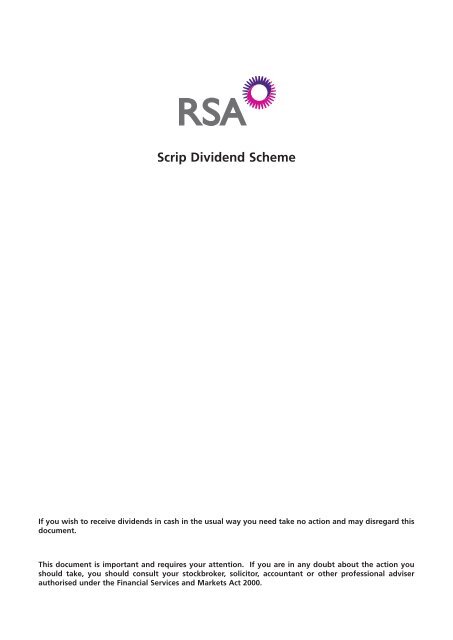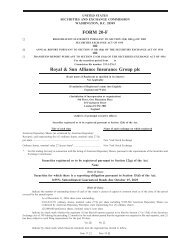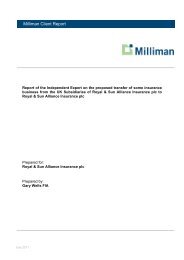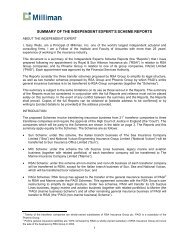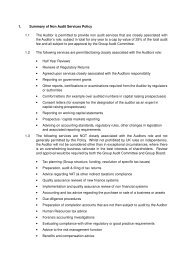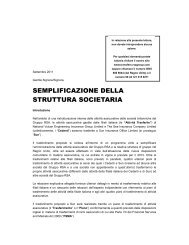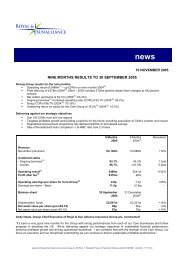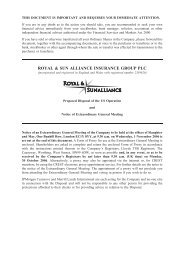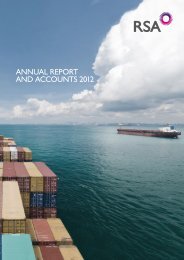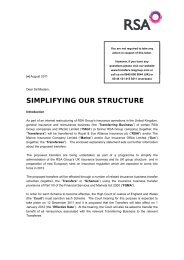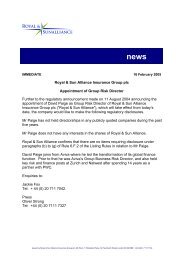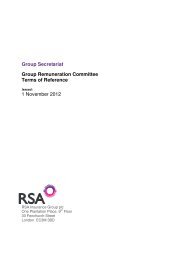Scrip Dividend Scheme
Scrip Dividend Scheme
Scrip Dividend Scheme
Create successful ePaper yourself
Turn your PDF publications into a flip-book with our unique Google optimized e-Paper software.
<strong>Scrip</strong> <strong>Dividend</strong> <strong>Scheme</strong><br />
If you wish to receive dividends in cash in the usual way you need take no action and may disregard this<br />
document.<br />
This document is important and requires your attention. If you are in any doubt about the action you<br />
should take, you should consult your stockbroker, solicitor, accountant or other professional adviser<br />
authorised under the Financial Services and Markets Act 2000.
1. WHAT IS THE SCRIP DIVIDEND SCHEME?<br />
The Company is offering you a <strong>Scrip</strong> <strong>Dividend</strong> <strong>Scheme</strong> which enables you to receive new<br />
Ordinary Shares of 27.5p each instead of cash dividends. The <strong>Scheme</strong> will apply to both<br />
interim and final dividends and enables you to increase your holding in the Company<br />
without incurring dealing costs or stamp duty. At the same time, the Company retains<br />
cash for reinvestment in the business which would otherwise be paid as a dividend.<br />
2. WHO CAN JOIN THE SCHEME?<br />
All UK Shareholders can join the <strong>Scheme</strong>. For details regarding overseas Shareholders,<br />
please see the answer to question 10.<br />
3. HOW DO I JOIN THE SCHEME?<br />
Please complete the enclosed Mandate Form and return it to Equiniti Limited, Share<br />
<strong>Dividend</strong> Operations, Aspect House, Spencer Road, Lancing, West Sussex BN99 6DA. No<br />
acknowledgement will be issued.<br />
Your Mandate will remain in force for all future dividends until cancelled by you in<br />
writing. For further details see the answer to question 15.<br />
Mandate Forms must be received by Equiniti Limited at least 20 working days before the<br />
dividend payment date to be eligible for that dividend. For details of this date for each<br />
interim and final dividend please refer to the Company’s website or call the Equiniti<br />
Limited share dividend helpline on 0871 384 2268, (calls to this number are charged at 8p<br />
per minute from a BT landline, other telephony provider costs may vary), or +44 121 415<br />
7173 if you are calling from a mobile phone or from overseas. Shareholders with a text<br />
phone facility should use 0871 384 2255. Mandate Forms received after that date will be<br />
applied in time for the next dividend.<br />
4. HOW MANY NEW SHARES WILL I RECEIVE?<br />
The number of New Shares you will receive for each dividend will depend on:<br />
(a)<br />
(b)<br />
(c)<br />
the amount of the cash dividend;<br />
the number of Ordinary Shares registered in your name; and<br />
the price to be used in calculating your New Share entitlement. This will be the<br />
average of the middle market quotations of an Ordinary Share, derived from the<br />
London Stock Exchange Daily Official List, for the five business days starting on<br />
the day the Ordinary Shares are first quoted ex-dividend.<br />
Fractions of New Shares will not be issued and any cash balance will be carried forward,<br />
without interest, and included in the calculation for the next dividend payment.<br />
1
For example only:<br />
• The cash dividend is 2p per Ordinary Share.<br />
• You hold 1,000 Ordinary Shares and take New Shares instead of the cash dividend.<br />
• The calculation price is £1.05<br />
Value of your cash dividend 1,000 x 2p = £20.00<br />
Number of New Shares £20.00 ÷ £1.05 = 19.05<br />
Rounded down to 19 New Shares.<br />
Value of New Shares 19 x £1.05 = £19.95<br />
In this case a cash balance of 5 pence would be carried forward to the next dividend<br />
payment. (See question 6.)<br />
5. HOW WILL I KNOW HOW MANY NEW SHARES I HAVE RECEIVED?<br />
You will receive a statement with your share certificate showing the number of New<br />
Shares you have received instead of the cash dividend and any cash balance carried<br />
forward to the next dividend payment. The statement will also contain details of the<br />
calculation price and the notional tax credit, which you will need for your tax return. If<br />
you wish to know the calculation price before this, please contact Equiniti Limited three<br />
business days after the record date of the particular dividend. (See question 17.)<br />
If on any occasion your cash dividend entitlement, together with any cash balance<br />
brought forward, is insufficient to acquire at least one New Share, you will receive a<br />
statement explaining that no New Shares have been issued to you and showing how<br />
much cash has been carried forward to the next dividend.<br />
6. WHAT WILL YOU DO WITH THE CASH BALANCE?<br />
When working out your New Share entitlement, it is unlikely that the calculation will<br />
give rise to an exact number of New Shares. As fractions of New Shares cannot be issued,<br />
an entitlement to their cash value (being the cash balance) will be carried forward,<br />
without interest, and included in the calculation for your next dividend.<br />
If you withdraw from the <strong>Scheme</strong> or if you sell or transfer your entire holding of Ordinary<br />
Shares, or if the Company terminates the <strong>Scheme</strong> or if (being the sole Shareholder) you<br />
die, are declared bankrupt, go into liquidation or suffer from mental incapacity, any cash<br />
balance held will be paid to you or your estate or trustee entitled as soon as reasonably<br />
practicable.<br />
2
7. WHEN WILL I RECEIVE MY SHARE CERTIFICATE?<br />
Subject to the New Shares being admitted to the official list of the UK Listing Authority<br />
and to trading on the London Stock Exchange’s market for listed securities, share<br />
certificates will be posted, at your risk, on or about the same day as dividend warrants<br />
are posted to Shareholders who are taking the dividend in cash. CREST members will<br />
have their CREST accounts credited directly with New Shares on the same day the cash<br />
dividend is paid. In the unlikely event that the New Shares are not admitted to listing,<br />
the dividend for Shareholders who have chosen to receive New Shares will be paid in cash<br />
as soon as reasonably practicable.<br />
When issued, the New Shares will rank equally in all respects with the existing Ordinary<br />
Shares and will qualify for all future dividends.<br />
8. DOES THE SCHEME APPLY TO ORDINARY SHARES HELD IN JOINT NAMES?<br />
Yes, but all joint Shareholders must sign the Mandate Form.<br />
9. CAN I COMPLETE A MANDATE FORM FOR PART OF MY HOLDING?<br />
No. Mandate Forms will not be accepted for part of a shareholding. The Mandate Form<br />
applies to the full number of Ordinary Shares registered in your name at any time.<br />
Notwithstanding this, the Company may at its discretion permit a Shareholder to<br />
complete a Mandate Form in respect of a lesser number of Ordinary Shares than the full<br />
shareholding where that Shareholder is acting on behalf of more than one beneficial<br />
owner i.e. a nominee Shareholder. Any such completion in respect of part of a<br />
shareholding will continue to apply for future dividends to the number of Ordinary<br />
Shares specified until it is altered or cancelled. A cash dividend will automatically be paid<br />
on any Ordinary Shares which are not specified in a Mandate Form.<br />
10. CAN OVERSEAS SHAREHOLDERS JOIN THE SCHEME?<br />
Yes. However, it is the responsibility of any person outside the United Kingdom wishing<br />
to receive New Shares to ensure that an election to receive such New Shares can validly<br />
be made without any further obligation on the part of the Company, and to satisfy<br />
himself or herself as to the full observance of the laws of the relevant territory, including<br />
complying with any regulatory or legal procedures which may be required and observing<br />
all other necessary formalities.<br />
11. WHAT HAPPENS IF I BUY MORE SHARES AFTER I HAVE COMPLETED A MANDATE FORM?<br />
Any additional Ordinary Shares which you buy, and which are registered in your name<br />
prior to the record date for any dividend, will be covered by the Mandate Form you have<br />
completed and you will receive New Shares instead of cash dividends for your entire<br />
holding.<br />
12. WHAT HAPPENS IF I SELL PART OF MY HOLDING?<br />
The <strong>Scheme</strong> will apply to your remaining Ordinary Shares.<br />
3
13. WHAT HAPPENS IF I HAVE MORE THAN ONE HOLDING?<br />
If your Ordinary Shares are registered in more than one holding and you want to receive<br />
New Shares instead of cash dividends, you must complete a separate Mandate Form for<br />
each holding. If you wish, you may ask Equiniti Limited to combine your holdings. You<br />
cannot however combine a sole shareholding with a joint shareholding.<br />
14. WHAT ARE THE TAX EFFECTS?<br />
The tax effect of taking New Shares will depend on each Shareholder’s individual<br />
circumstances. Explanatory notes are given on pages 6 and 7.<br />
It must be stressed that if you are not sure how you will be affected, it is recommended<br />
that you consult your professional adviser before taking any action.<br />
15. CAN I CANCEL MY INSTRUCTIONS?<br />
You may cancel your instructions at any time by writing to Equiniti Limited, Share<br />
<strong>Dividend</strong> Operations, Aspect House, Spencer Road, Lancing, West Sussex BN99 6DA. For<br />
a cancellation to be effective for a particular dividend, it must be received at least 20<br />
working days before the payment date for that dividend. If a cancellation is received<br />
after that date, it will apply to all subsequent dividends.<br />
Instructions will be regarded as cancelled for any Ordinary Shares which a Shareholder<br />
sells or otherwise transfers to another person. This will take effect from registration of<br />
the share transfer.<br />
Instructions will be cancelled immediately on notice of death, bankruptcy or mental<br />
incapacity of a Shareholder.<br />
16. CAN THE COMPANY CANCEL THE SCHEME?<br />
The <strong>Scrip</strong> <strong>Dividend</strong> <strong>Scheme</strong> may be amended, suspended or terminated at any time at the<br />
discretion of the Directors by notice in writing to Shareholders. In the case of an<br />
amendment, your instructions will remain valid under the amended terms unless you<br />
notify Equiniti Limited in writing to the contrary.<br />
To protect Shareholders participating in the <strong>Scheme</strong>, Mandate Forms may be cancelled or<br />
suspended respectively by the Directors at their sole discretion if 20 working days prior<br />
to the dividend payment date the price of an Ordinary Share has fallen 15 per cent. or<br />
more below the calculation price used to determine Shareholders’ entitlements. In the<br />
event, and if the Directors cancel or suspend Mandates, Shareholders will receive their<br />
dividend in cash as soon as possible.<br />
17. WHAT DO I DO IF I HAVE ANY QUESTIONS?<br />
Please write to Equiniti Limited, Share <strong>Dividend</strong> Operations, Aspect House, Spencer Road,<br />
Lancing, West Sussex BN99 6DA.<br />
If you wish to know the calculation price or you have any other enquiries concerning<br />
the <strong>Scheme</strong> please call Equiniti Limited, tel 0871 384 2268, (calls to this number are<br />
charged at 8p per minute from a BT landline, other telephony provider costs may vary),<br />
or +44 121 415 7173 if you are calling from a mobile phone or from overseas.<br />
Shareholders with a text phone facility should use 0871 384 2255.<br />
If you wish to receive dividends in cash in the usual way you need take no action and may<br />
disregard this document.<br />
4
DEFINITIONS<br />
“CREST”<br />
“Directors”<br />
“London Stock Exchange”<br />
“Mandate”<br />
“Mandate Form”<br />
“New Shares”<br />
“Ordinary Shares”<br />
the “Company”<br />
“<strong>Scrip</strong> <strong>Dividend</strong> <strong>Scheme</strong>” or<br />
“<strong>Scheme</strong>”<br />
“Shareholder”<br />
the relevant system (as defined in the Uncertificated<br />
Securities Regulations 2001 (SI/3755)) in respect of which<br />
CRESTCo Limited is the operator<br />
the directors of RSA Insurance Group plc<br />
the London Stock Exchange plc<br />
the instructions of a Shareholder as set out in a valid<br />
Mandate Form<br />
a mandate in a form provided by the Company from a<br />
Shareholder to the Directors to allot under the terms of the<br />
<strong>Scheme</strong> New Shares in lieu of cash dividends to which they<br />
may become entitled from time to time<br />
new Ordinary Shares issued under the <strong>Scheme</strong><br />
ordinary shares of 27.5p each in the capital of the Company<br />
RSA Insurance Group plc<br />
the RSA Insurance Group plc <strong>Scrip</strong> <strong>Dividend</strong> <strong>Scheme</strong><br />
comprised in the terms and conditions contained in this<br />
document as amended from time to time<br />
a holder of Ordinary Shares<br />
5
TAXATION<br />
The Company has been advised that, under current United Kingdom legislation, the taxation<br />
consequences for Shareholders electing to receive New Shares instead of a cash dividend will,<br />
broadly, be as follows. This summary only relates to the position of Shareholders resident in the<br />
United Kingdom for taxation purposes who hold their shares as an investment. The precise<br />
taxation consequences for a particular Shareholder will depend on that Shareholder’s individual<br />
circumstances.<br />
This summary of the taxation treatment is not exhaustive. If you are in any doubt as to your<br />
tax position, you should consult your professional adviser before taking any action.<br />
Individuals<br />
Where individuals elect to receive New Shares in place of a cash dividend, they will be treated as<br />
having received gross income of an amount which, when reduced by income tax at the rate of<br />
10 per cent. is equal to the “cash equivalent of the New Shares”. The cash equivalent of the New<br />
Shares will be the amount of the cash dividend foregone unless the market value of the New<br />
Shares on the first day of dealings on the London Stock Exchange (the “opening value”) differs<br />
substantially (i.e. by 15 per cent. or more either way according to current HM Revenue & Customs<br />
practice) from the cash dividend foregone in which case the opening value will be treated as the<br />
cash equivalent of the New Shares for taxation purposes.<br />
Individuals who (after having taken into account their receipt of New Shares) pay income tax at<br />
the starting rate of 10 per cent. or the basic rate of 20 per cent. only will have no further liability<br />
to income tax in respect of the New Shares received. Individuals who are otherwise subject to<br />
income tax at the higher rate of 40 per cent. will be liable to pay tax at the reduced rate of 32.5<br />
per cent. on the gross income which they are treated as having received. For example, if the cash<br />
equivalent of the New Shares received is £80, the individual will be treated as having received<br />
gross income of £88.88 and as having paid income tax of £8.88 on that gross amount. The higher<br />
rate tax payer will be liable to pay additional tax of £20 (the difference between £28.88 and the<br />
£8.88 treated as having been paid). Subject to what is said above in relation to the<br />
determination of the cash equivalent of the New Shares, this is the same treatment as for cash<br />
dividends.<br />
For capital gains tax purposes, if an election to receive New Shares instead of a cash dividend is<br />
made, then the “cash equivalent of the New Shares” (as described above) will be treated as being<br />
the base cost for the New Shares. The New Shares will be treated as having been acquired as a<br />
separate acquisition from the existing shares and capital gains tax at a flat rate of 18% will apply<br />
to any gains arising on disposal (subject to any annual exemptions available).<br />
6
Trustees<br />
This section assumes, as is likely to be the case, that New Shares received by trustees if they elect<br />
to receive the dividends under the <strong>Scheme</strong> will be income in the hands of the trustees for trust<br />
law purposes. Trustees who are liable to income tax at the rate applicable to trusts of 40 per cent<br />
will only pay tax on dividends received at the rate of 32.5 per cent. Where such trustees elect to<br />
receive new ordinary shares, the same grossing-up procedure as outlined above for individuals<br />
will apply. Thus, the trustees will be treated as having received gross income of an amount which,<br />
when reduced by income tax at the rate of 10 per cent, is equal to the cash equivalent. The<br />
trustees will then be liable to pay additional tax of 22.5 per cent of the grossed up amount of<br />
the cash equivalent. Subject to what is said above in relation to the determination of the cash<br />
equivalent of the New Shares, this is the same treatment as for cash dividends. For such trustees<br />
the capital gains tax treatment of the New Shares will be the same as that for individuals<br />
(see above).<br />
The position in relation to an interest in possession trust is understood to be as follows but<br />
trustees of any such trust should consult their professional adviser regarding the tax position<br />
before taking action. If the trustees elect to receive New Shares instead of a cash dividend, they<br />
will not be subject to income tax on these New Shares. The individual beneficiary with an<br />
interest in possession will be beneficially entitled to the New Shares and will be subject to income<br />
tax on them in the way outlined above. The capital gains tax position in these circumstances will<br />
be that the New Shares will not form part of the trustees existing holding but will be treated as<br />
a new holding acquired by the relevant beneficiary for an amount equal to the cash equivalent<br />
of the New Shares (as defined above).<br />
Companies<br />
A corporate shareholder is not generally liable to corporation tax on cash dividends and will not<br />
be charged to corporation tax on New Shares received instead of a cash dividend. For the<br />
purposes of corporation tax on chargeable gains, no consideration will be treated as having been<br />
given for the New Shares which will be treated as having been acquired when the existing<br />
Ordinary Shares in the enlarged holding were acquired.<br />
Pension Funds<br />
Where pension funds elect to receive the dividend under the <strong>Scheme</strong> no tax credit will attach to<br />
the New Shares. Pension funds would not be able to claim repayment of the tax credit on the<br />
equivalent cash dividend.<br />
Stamp Duty and Stamp Duty Reserve Tax<br />
No stamp duty or stamp duty reserve tax will be payable on the receipt of New Shares under the<br />
<strong>Scheme</strong>.<br />
7


